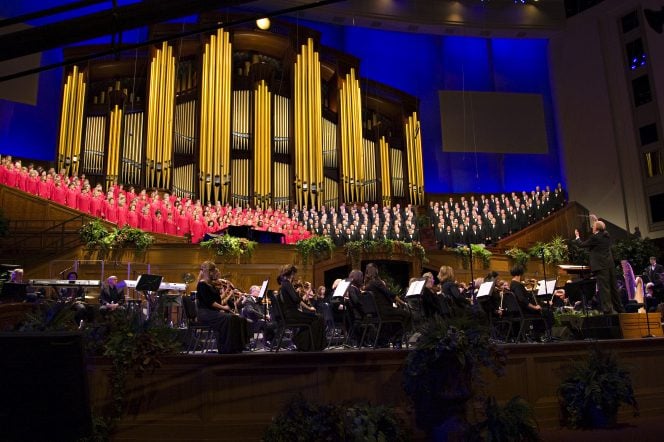
As soon as Elder Bednar opened his remarks this morning, I turned to my wife and predicted that he would cite President J. Reuben Clark’s justly famous 1947 speech “To Them of the Last Wagon.” And indeed he did. (I’ll be available for the signing of autographs for the next week or so.) I loved what he had to say, which I expect will bear the title, when published, of “In the Path of Their Duty,” or something of that sort. It is absolutely true that the vast majority of the work of the Church is done privately or before very few eyes, and by people whose names are known only to their immediate family, their small social circle, and, yes, to God. I was grateful for Elder Bednar’s tribute, his expression of gratitude, to them.
As I listened to Elder Robert M. Daines speak (https://www.churchofjesuschrist.org/learn/robert-m-daines?lang=eng), I thought of the “testimonies” that I have seen from more than a few formerly active members of the Church of Jesus Christ of Latter-day Saints, which speak of having felt overwhelmed by rules during their days of activity, and of a perpetual sense of guilt or inadequacy as aspiring Saints. I feel for them. Their experience with the Church has not been mine, but I don’t doubt that they felt as they describe. I wonder what could have been done to help them. I wonder what might be done now to help them and, urgently, what might be done to help those who are currently feeling as they felt.
I loved Elder Ian S. Ardern’s comments about poverty and want in Africa, and about Church humanitarian aid there. Thanks to Louis and Ireta Midgley, I first met Elder Ardern in his native New Zealand long before he was a General Authority or even a mission president. He has spent much of his ministry in far-flung areas of the world where humanitarian aid has been a chronic need or, sometimes, an urgent and pressing need after a natural catastrophe. I’ve been fortunate to have heard a little bit about some of his experiences over the years.
I appreciated Elder Gary Stevenson’s four principles for learning to hear the Spirit: (1) Stand in holy places. (2) Stand with holy people. (3) Testify of holy truths. (4) Listen to the Spirit. He fleshed those four principles out in helpful ways, and gave other helpful guidance. I felt some resolutions coming on as I listened to him.
The minute I heard the Proclamation on the Family mentioned favorably, and as authoritative, by President Dallin H. Oaks, I knew that he would be fiercely attacked online for having done so. And, indeed, I’ve been saddened but not at all surprised to see him (and the Church’s affirmation of marriage between a man and a woman as the divine standard) labeled “vile,” “hateful,” and full of “bile.” None of which, in case you didn’t hear his remarks, was even slightly in evidence.
I enjoyed Elder Neil L. Andersen’s remarks about tithing and about Church finances. These are controversial topics in recent years. Some cynics out there claim that money is the only thing that the leaders of the Church value or care about, which, it seems to me, speaks far more eloquently about those cynics than it does about the leaders of the Church—many of whom have quite plainly made considerable sacrifices, financial and otherwise, in order to serve the Lord.
As a centerpiece of his conference address, Elder Yoon Hwan Choi quoted a passage from the Book of Mormon that has become, somewhat to my surprise, one of my favorite verses of scripture. (I’m tempted to say, as I once heard President Boyd K. Packer say of a different Book of Mormon verse, that it simply wasn’t there during my previous readings.) It is Mosiah 2:41, a very simple passage. I probably overlooked it in my younger days partly because of its very simplicity. As I grow older, though, inevitably approaching my own departure, and with many of loved ones and friends already passed on, it has begun to mean a great deal to me:
And moreover, I would desire that ye should consider on the blessed and happy state of those that keep the commandments of God. For behold, they are blessed in all things, both temporal and spiritual; and if they hold out faithful to the end they are received into heaven, that thereby they may dwell with God in a state of never-ending happiness. O remember, remember that these things are true; for the Lord God hath spoken it.
Elder Alan T. Phillips asked a really good question: Are we, he asked, merely passively attending church? Or are we actively seeking to build a community of caring and faith? That’s something to ponder.
So, also, is Elder Ronald A. Rasband’s invitation for older couples to serve missions. My wife and I have considered this matter a great deal. Right now, our conviction (which, I realize full well, will be mocked and derided by the usual suspects) is that, through our daily involvement in the work of the Interpreter Foundation and given the multiple massive Church-related writing projects that I have underway and the regular small-scale Church-related writing that I do every week, we are serving a kind of mission. And we’re pedaling about as fast as we can.
I’m going to act here on Elder Stevenson’s advice, by bearing my testimony of holy truth: I am so very, very grateful for my membership in the Church of Jesus Christ of Latter-day Saints and for my faith in the Restored Gospel of Jesus. From the first days in my adolescence when I began to perceive the richness, power, and generosity, and the sheer magnificence, of the Plan of Salvation—behind what had seemed to me, son of a non-member father and a marginally active mother, the mundane and rather uninteresting activities of the Church as I had (stupidly) experienced them—I have never completely lost my deep sense that the divine plan is the greatest vision of the value and destiny of humanity of which I know or of which I can even conceive. And it has the wonderful added benefit that it is actually true.
What conference talks stood out for you? Can you explain why?













